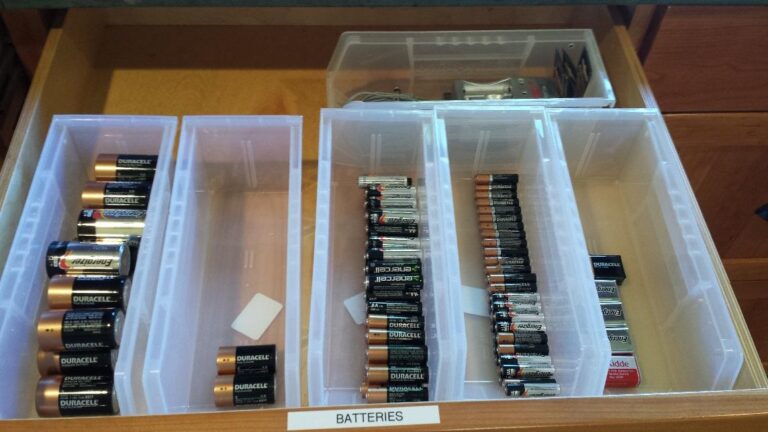Table of Contents
- Choosing the Right Environment for Battery Storage
- Understanding Temperature and Humidity Effects on Battery Life
- Best Practices for Organizing and Securing Batteries
- Essential Safety Precautions to Prevent Damage and Accidents
- In Summary
Choosing the Right Environment for Battery Storage
Selecting an appropriate space to keep your batteries is essential for maintaining their longevity and performance. Ideally, batteries should be stored in a cool, dry area where temperature fluctuations are minimal. Avoid places with excessive heat or direct sunlight, such as near heaters, windows, or in unventilated garages, as high temperatures can accelerate battery degradation. Conversely, extremely cold environments can reduce the effective capacity of batteries, making them less reliable when you need them most.
Aside from temperature control, the environment should also be free from moisture and corrosive elements. A well-ventilated room helps prevent any buildup of harmful gases that might leak from certain battery types. When organizing your batteries, consider these tips for optimal storage:
- Place batteries in their original packaging or cover terminals with non-conductive tape.
- Store different battery types separately to avoid chemical reactions or accidental short circuits.
- Use battery storage cases or containers designed to insulate and protect batteries from environmental factors.
- Keep batteries out of reach of children and pets to enhance safety.
Understanding Temperature and Humidity Effects on Battery Life
Batteries are highly sensitive to their surrounding environment, with temperature and humidity playing pivotal roles in determining their lifespan. High temperatures accelerate chemical reactions inside the battery, which can initially boost performance but ultimately lead to premature aging and capacity loss. Conversely, extremely low temperatures slow down these reactions, reducing the battery’s effective capacity and making it temporarily less efficient. Maintaining a stable, moderate temperature environment-ideally between 15°C and 25°C-is crucial to safeguard battery health over time.
Humidity levels also impact battery safety and longevity. Excess moisture in the air can cause corrosion of battery terminals and promote internal short-circuiting, while overly dry conditions may lead to drying out of electrolyte components in certain battery types. To mitigate these risks, consider the following tips:
- Store batteries in a cool, dry place with controlled humidity (ideally between 30% and 50%).
- Use airtight containers or moisture-absorbing packets to minimize exposure to excess moisture.
- Avoid storing batteries in locations prone to rapid temperature fluctuations such as near heaters or windows.
Best Practices for Organizing and Securing Batteries
Properly organizing your battery collection starts with categorizing them by type, size, and charge status. Storing different chemistries-such as alkaline, lithium, and rechargeable NiMH-separately helps prevent potential chemical reactions or damage. Use clear, labeled containers to keep batteries visible and easy to identify, reducing the chances of mixing expired or damaged cells with usable ones. Additionally, avoid storing batteries loose in drawers or boxes where terminals can accidentally touch, causing short circuits. Instead, keep battery terminals covered or use original packaging whenever possible to maintain safety.
Securing batteries also means controlling environmental factors. Keep batteries in a cool, dry place with moderate temperature to maintain optimal performance and shelf life. Avoid storing them near heat sources, in direct sunlight, or places with high humidity, which can accelerate corrosion or leakage. For lithium-ion and rechargeable batteries, consider using containers with ventilation and avoid airtight seals to prevent heat buildup. By adopting these strategies, you not only extend battery life but also minimize fire risks and environmental hazards.
Essential Safety Precautions to Prevent Damage and Accidents
When it comes to storing batteries, overlooking basic safety measures can lead to costly damage or even dangerous accidents. One of the foremost rules is to always keep batteries in a cool, dry place away from direct sunlight and heat sources. Excessive heat accelerates the risk of leakage, swelling, or even explosion, particularly with lithium-ion batteries. Additionally, never store batteries loosely in drawers or containers where they can come into contact with metal objects such as coins, keys, or tools. This contact can create short circuits, which may result in fires or permanent battery failure.
Proper organization and handling go hand-in-hand with safe storage. Store batteries in their original packaging or in specially designed battery cases that prevent terminals from touching each other. It’s also crucial to keep old or damaged batteries separate from new ones to avoid cross-contamination or chemical reactions. Remember to regularly check stored batteries for signs of corrosion or leakage and dispose of them appropriately if they show any damage. Incorporating these precautions not only extends battery life but protects your home and devices from unexpected battery hazards.
- Maintain storage temperatures between 15-25°C (59-77°F).
- Label battery containers with purchase and expiry dates.
- Keep batteries out of reach of children and pets.
- Use insulated covers or tape on battery terminals when storing spare cells.
In Summary
Storing batteries safely is more important than many realize, not only to extend their lifespan but also to prevent potential hazards. By following simple yet effective tips-such as keeping batteries in a cool, dry place, avoiding metal contacts, and regularly checking for leaks-you can ensure that your batteries remain reliable and safe for use when you need them. Whether for everyday household use or specialized equipment, proper battery storage is a small habit that pays off in safety and performance. Remember, a little care today goes a long way toward preventing accidents tomorrow. Stay informed, stay safe, and keep your batteries ready to power your life efficiently.Check Our Other Blogs
- StunGun – Your Trusted Source for Stun Guns, Laws, and Self-Defense Tips
- PepperSprayLaws – Your Trusted Resource for Pepper Spray Information
- StunGunLaws – Your Trusted Guide to Stun Gun Legality and Safety





